外研版九年级下册Module 2 Unit 3 Language in use Revision课件+音频(共19张PPT)
文档属性
| 名称 | 外研版九年级下册Module 2 Unit 3 Language in use Revision课件+音频(共19张PPT) |
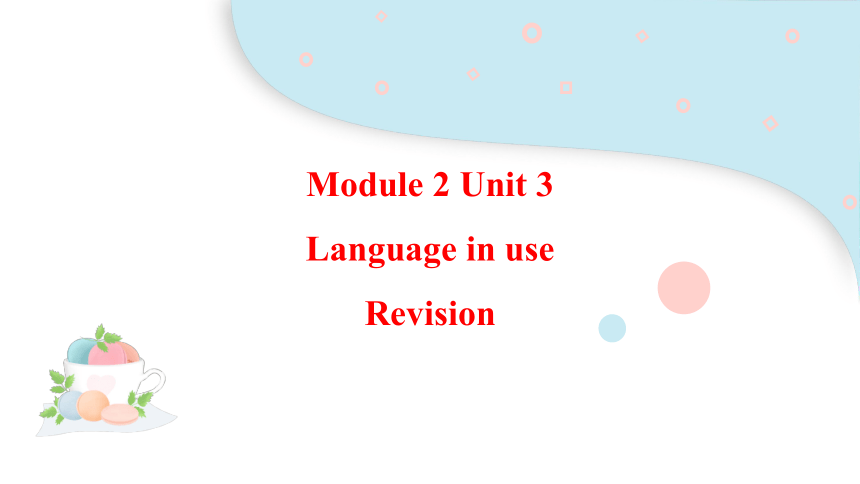
|
|
| 格式 | pptx | ||
| 文件大小 | 4.5MB | ||
| 资源类型 | 教案 | ||
| 版本资源 | 外研版 | ||
| 科目 | 英语 | ||
| 更新时间 | 2025-04-27 20:16:00 | ||
图片预览



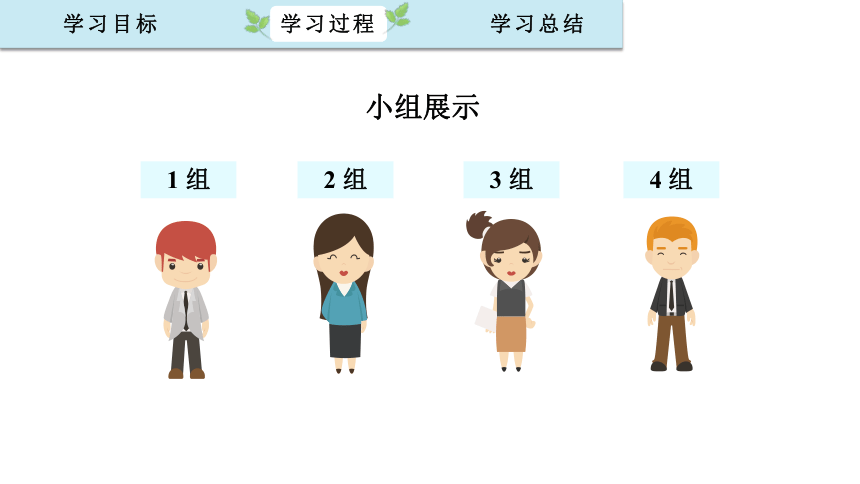
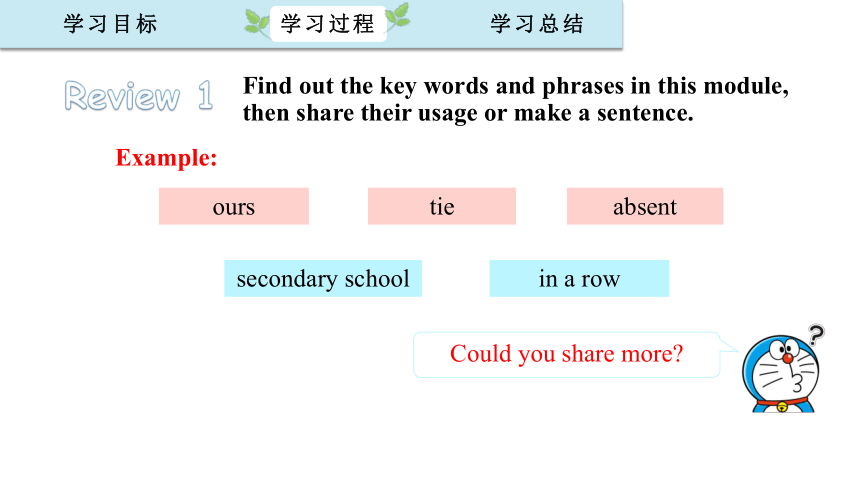
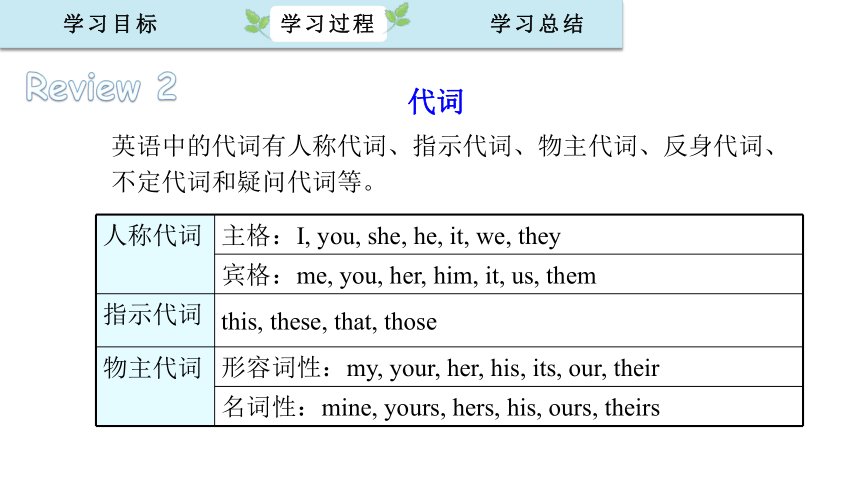
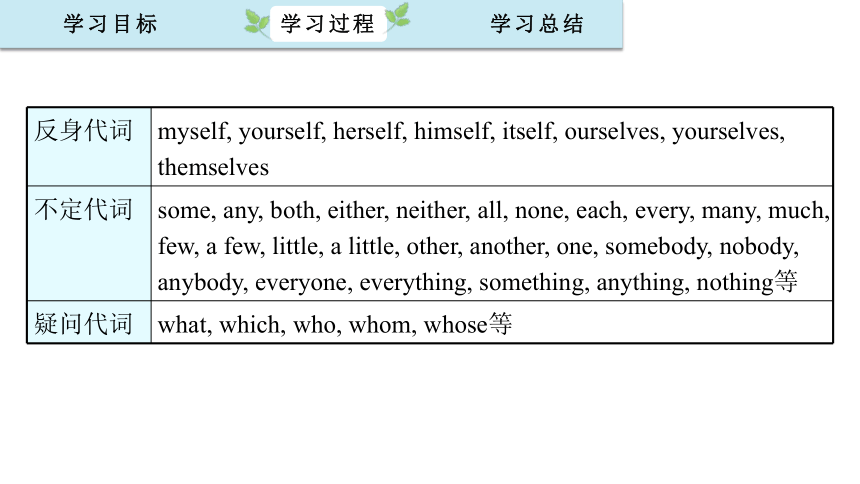
文档简介
(共19张PPT)
Module 2 Unit 3
Language in use
Revision
1
2
能写一份宣传单介绍自己的学校。
能归纳、复习并巩固本模块知识点。
Activity 1
Group Work
以小组为单位,回忆归纳:
(1) 本模块重点单词和短语有哪些?
(2) 介词和代词的用法
每个小组派一个代表发言。
目标一: 能归纳、复习并巩固本模块知识点
1 组
2 组
3 组
4 组
小组展示
Find out the key words and phrases in this module, then share their usage or make a sentence.
Review 1
Could you share more
ours
secondary school
in a row
tie
Example:
absent
Review 2
英语中的代词有人称代词、指示代词、物主代词、反身代词、不定代词和疑问代词等。
人称代词 主格:I, you, she, he, it, we, they
宾格:me, you, her, him, it, us, them
指示代词 this, these, that, those
物主代词 形容词性:my, your, her, his, its, our, their
名词性:mine, yours, hers, his, ours, theirs
代词
反身代词 myself, yourself, herself, himself, itself, ourselves, yourselves, themselves
不定代词 some, any, both, either, neither, all, none, each, every, many, much, few, a few, little, a little, other, another, one, somebody, nobody, anybody, everyone, everything, something, anything, nothing等
疑问代词 what, which, who, whom, whose等
介词与介词短语
介词是一种用来表示人物、事件之间关系的词。介词是一种虚词,不能独立存在,需要与其他成分一起构成介词短语用于句中。介词分类如下:
介词不能单独构成句子成分,必须以介词短语的形式来构成句子成分。这里重点介绍由“介词+名词”构成的介词短语,如 in the park, by car, on Saturday, in front of the classroom等。这类介词短语在句中可以作状语、定语和表语等。
1.介词短语及用法
2.介词的兼词现象
有些单词既可以用作连词也可以用作介词,而有些单词既可以用作介词又可以用作副词,应注意区分它们在句子中的不同功能。
5
Complete the sentences so they are true for you.
I study _______ subjects: English, _______________________
____________________________________________________.
2) I don’t study _____________________.
3) I take exams in _______________________________________, ____________but I don’t take exams in _______________.
4) My favorite sport is ___________ because_______________.
5) I usually play sports on _____________.
6) After-school activities, such as __________________ are very popular at our school.
Activity 2
Activity 3
Pete and Kate are talking about their different experiences at River School. Listen and finish some tasks.
1.Where does Kate want to go on holiday next year
2.What game has Pete played since primary school
3.When do Kate and Pete have sports practice
Kate wants to go to Germany on holiday next year.
Pete has played chess since primary school.
Kate and Pete have sports practice on Wednesday afternoons.
Task 1 Listen and answer the questions.
Task 2 Listen again and complete the table.
School year Special subject Club Sport Plan for next year
Kate
Pete
Year 9
German
language club
tennis
holiday in Germany
Year 10
Geography
language club chess club
football
win all my chess matches
8
Read the passage and say where you think it comes from.
Activity 4
A dictionary. b) A school website. c) A storybook.
Now match the headings with the paragraphs.
a) Clubs □ b) School hours □
c) Sports □ d) Subjects □
1
2
3
4
9
Read the passage again and check (√) the true sentences.
1. The head teacher speaks to the whole school on Fridays.
2. The lunch break is less than one hour.
3. Students take exams in all the subjects they study.
4. Students can join more than one club.
√
√
目标二:能写一份宣传单介绍自己的学校
Module Task: Make a leaflet about your school
Step 1: Work in pairs. Discuss and write sentences about your school.
Write sentences about the facts.
There are … students and … teachers in our school. Students can study …
After school, there are … and …
Write sentences about your opinions.
The thing I like best about our school is … because …
Step 2: Make a leaflet about your school for new students.
Make a leaflet to introduce your school to new students. Use the sentences in Activity 10.
Draw pictures and make designs where necessary.
Leaflet is to help new students coming to the school.
What have you learned in Module 2
Around the world
No teachers needed
When it comes to learning, the environment has a big part to play. This has been shown in a long-term study by Professor Mitra from India. He set up computers in a village in India where children could not speak English. They did not know what a computer looked like or what the Internet was. To everyone’s surprise, children taught themselves how to use the machines in a very short period of time. This suggests that children can learn fast with little help. Professor Mitra thinks this could change schools. He is now working on so called SOLEs (Self-Organised Learning Environments). He explains that SOLEs include at least a computer and a bench big enough for four pupils. SOLEs have also been tested in some other countries such as the UK and Italy, with encouraging results.
Module 2 Unit 3
Language in use
Revision
1
2
能写一份宣传单介绍自己的学校。
能归纳、复习并巩固本模块知识点。
Activity 1
Group Work
以小组为单位,回忆归纳:
(1) 本模块重点单词和短语有哪些?
(2) 介词和代词的用法
每个小组派一个代表发言。
目标一: 能归纳、复习并巩固本模块知识点
1 组
2 组
3 组
4 组
小组展示
Find out the key words and phrases in this module, then share their usage or make a sentence.
Review 1
Could you share more
ours
secondary school
in a row
tie
Example:
absent
Review 2
英语中的代词有人称代词、指示代词、物主代词、反身代词、不定代词和疑问代词等。
人称代词 主格:I, you, she, he, it, we, they
宾格:me, you, her, him, it, us, them
指示代词 this, these, that, those
物主代词 形容词性:my, your, her, his, its, our, their
名词性:mine, yours, hers, his, ours, theirs
代词
反身代词 myself, yourself, herself, himself, itself, ourselves, yourselves, themselves
不定代词 some, any, both, either, neither, all, none, each, every, many, much, few, a few, little, a little, other, another, one, somebody, nobody, anybody, everyone, everything, something, anything, nothing等
疑问代词 what, which, who, whom, whose等
介词与介词短语
介词是一种用来表示人物、事件之间关系的词。介词是一种虚词,不能独立存在,需要与其他成分一起构成介词短语用于句中。介词分类如下:
介词不能单独构成句子成分,必须以介词短语的形式来构成句子成分。这里重点介绍由“介词+名词”构成的介词短语,如 in the park, by car, on Saturday, in front of the classroom等。这类介词短语在句中可以作状语、定语和表语等。
1.介词短语及用法
2.介词的兼词现象
有些单词既可以用作连词也可以用作介词,而有些单词既可以用作介词又可以用作副词,应注意区分它们在句子中的不同功能。
5
Complete the sentences so they are true for you.
I study _______ subjects: English, _______________________
____________________________________________________.
2) I don’t study _____________________.
3) I take exams in _______________________________________, ____________but I don’t take exams in _______________.
4) My favorite sport is ___________ because_______________.
5) I usually play sports on _____________.
6) After-school activities, such as __________________ are very popular at our school.
Activity 2
Activity 3
Pete and Kate are talking about their different experiences at River School. Listen and finish some tasks.
1.Where does Kate want to go on holiday next year
2.What game has Pete played since primary school
3.When do Kate and Pete have sports practice
Kate wants to go to Germany on holiday next year.
Pete has played chess since primary school.
Kate and Pete have sports practice on Wednesday afternoons.
Task 1 Listen and answer the questions.
Task 2 Listen again and complete the table.
School year Special subject Club Sport Plan for next year
Kate
Pete
Year 9
German
language club
tennis
holiday in Germany
Year 10
Geography
language club chess club
football
win all my chess matches
8
Read the passage and say where you think it comes from.
Activity 4
A dictionary. b) A school website. c) A storybook.
Now match the headings with the paragraphs.
a) Clubs □ b) School hours □
c) Sports □ d) Subjects □
1
2
3
4
9
Read the passage again and check (√) the true sentences.
1. The head teacher speaks to the whole school on Fridays.
2. The lunch break is less than one hour.
3. Students take exams in all the subjects they study.
4. Students can join more than one club.
√
√
目标二:能写一份宣传单介绍自己的学校
Module Task: Make a leaflet about your school
Step 1: Work in pairs. Discuss and write sentences about your school.
Write sentences about the facts.
There are … students and … teachers in our school. Students can study …
After school, there are … and …
Write sentences about your opinions.
The thing I like best about our school is … because …
Step 2: Make a leaflet about your school for new students.
Make a leaflet to introduce your school to new students. Use the sentences in Activity 10.
Draw pictures and make designs where necessary.
Leaflet is to help new students coming to the school.
What have you learned in Module 2
Around the world
No teachers needed
When it comes to learning, the environment has a big part to play. This has been shown in a long-term study by Professor Mitra from India. He set up computers in a village in India where children could not speak English. They did not know what a computer looked like or what the Internet was. To everyone’s surprise, children taught themselves how to use the machines in a very short period of time. This suggests that children can learn fast with little help. Professor Mitra thinks this could change schools. He is now working on so called SOLEs (Self-Organised Learning Environments). He explains that SOLEs include at least a computer and a bench big enough for four pupils. SOLEs have also been tested in some other countries such as the UK and Italy, with encouraging results.
同课章节目录
- Module 1 Travel
- Unit 1 We toured the city by bus and by taxi
- Unit 2 It's a long story.
- Unit 3 Language in use
- Module 2 Education
- Unit 1 They don't sit in rows.
- Unit 2 What do I like best about school?
- Unit 3 Language in use
- Module 3 Life now and then
- Unit 1 They sometimes work harder.
- Unit 2 I think life is better today.
- Unit 3 Language in use.
- Module 4 Rules and suggestions
- Unit 1 You must be careful of falling stones.
- Unit 2 we must keep the camp clean.
- Unit 3 Language in use.
- Revison A
- Module 5 Look after yourself
- Unit 1 We'd better get you to hospital.
- Unit 2 Get off the sofa!
- Unit 3 Language in use.
- Module 6 Eating togethe
- Unit 1 When is the school-leavers' party?
- Unit 2 Knives and forks are used for most Western
- Unit 3 Language in use
- Module 7 English for you and me
- Unit 1 Have you ever been to an English corner?
- Unit 2 We all own English.
- Unit 3 Language in use
- Module 8 My future life
- Unit 1 Here's to our friendship and the future
- Unit 2 I know that you will be better at maths.
- Unit 3 Language in use
- Revison B
